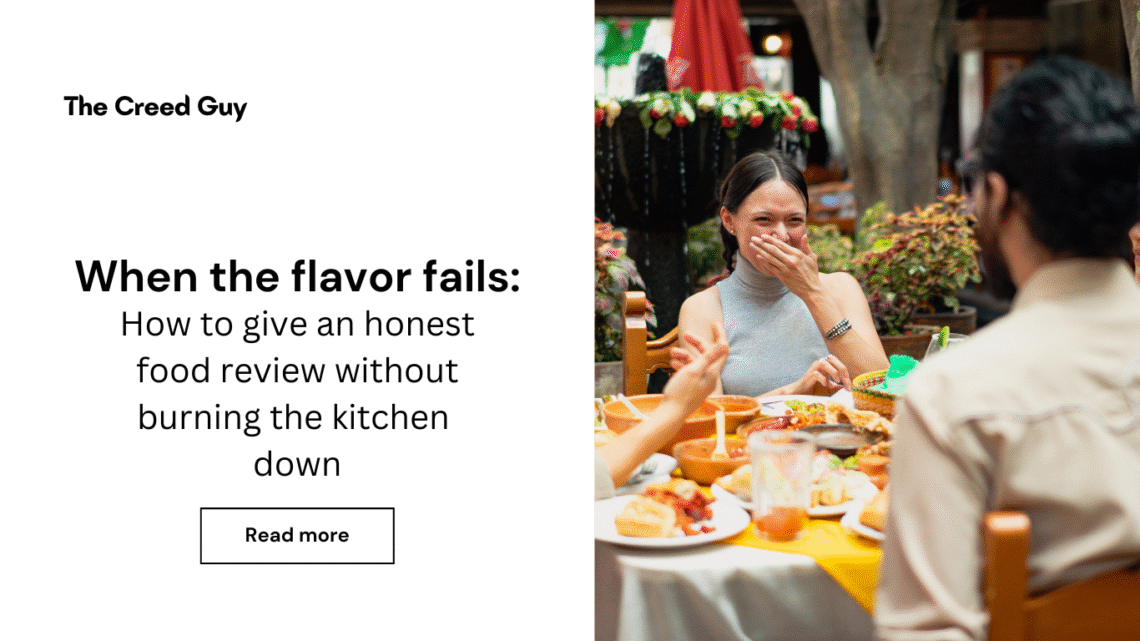
When the Flavor Fails: How to Give an Honest Food Review Without Burning the Kitchen Down
I’ve eaten dishes that made me feel like I was floating in the clouds. I’ve also had meals that made me question my life choices. Let’s be honest—not all food will be good. Not every restaurant visit will be Instagram-worthy. But here’s the thing: there’s a right and respectful way to say “I didn’t like it.”
Lately, the internet has been in flames again—another food review gone wrong, another content creator trending for the wrong reasons. It always starts with a bite, a camera, and then, boom—a viral comment that turns the table upside down.
And it made me think: Why have we forgotten how to be honest and kind at the same time?
Taste Is Personal, Not Universal
Let’s get one thing straight—taste is subjective. What I find bland, someone else might find comforting. What’s too salty for me might be just right for a different palate. So when we don’t like something, it’s not about declaring a universal truth. It’s about sharing a personal experience.
Instead of saying:
❌ “This is disgusting.”
We can try:
✅ “Personally, I found the flavor too strong for my taste, but others might enjoy it.”
See the difference? One burns bridges, the other opens doors.
You Can Be Honest Without Being Cruel
It’s possible to say “I didn’t like this” without insulting the people behind the dish. Think of the effort—someone woke up early to prep that meal, seasoned it, cooked it, plated it, and served it with pride. Even if the result wasn’t your cup of tea, the work deserves basic human respect.
If you’re a reviewer or a content creator, your words have weight. One careless comment can cause real damage—financially, emotionally, and mentally. Do you really want your 2 minutes of clout to cost someone their livelihood?
Instead of saying:
❌ “This food is trash.”
Try:
✅ “It didn’t meet my expectations, especially considering the price and hype. Maybe it’s just not for me.”
It still gets your point across—but without crushing anyone’s soul.
Think Before You Post
Let’s pause before hitting upload. Ask yourself:
- Am I being fair?
- Am I judging based on personal taste or actual quality?
- Will this help or harm the people behind the business?
Sometimes, we mask meanness as “just being real.” But being real isn’t about being rude. You can keep it real without tearing someone down.
Context Matters
There are restaurants that thrive on fusion. Some proudly serve regional food that’s not meant to please everyone. Others are still finding their footing. If you walk into a place expecting five-star quality for a budget price, that’s on you, not the chef.
Be clear in your reviews—are you judging it based on fine dining standards, or as a neighborhood eatery? Are you comparing it to authentic regional dishes, or your own personal version of the recipe?
We have to review with context, not just emotions.
Reviews Can Be Powerful—Use That Power Well
The truth is, food vlogs and reviews can make or break small businesses. That’s a huge responsibility. When we use that power carelessly—especially just to go viral—it says more about us than the food.
If your goal is to create content that’s honest, helpful, and human, then take a breath before going live. Think of your review as a conversation, not a takedown.
Final Bite
There’s nothing wrong with disliking food. We all do. But how we express that dislike makes all the difference. As someone who loves food, supports local businesses, and believes in honest feedback, I’ve learned that respectful honesty tastes better than viral hate.
Let’s use our voices to uplift, not destroy. Because at the end of the day, we’re all just people trying to enjoy a good meal and share it with others.
Related article:
You May Also Like

Travel the world this summer with Globe budget-friendly roaming promos
April 4, 2023
Vista Land, Pioneering the Future of Real Estate in Mega Manila
November 10, 2024

